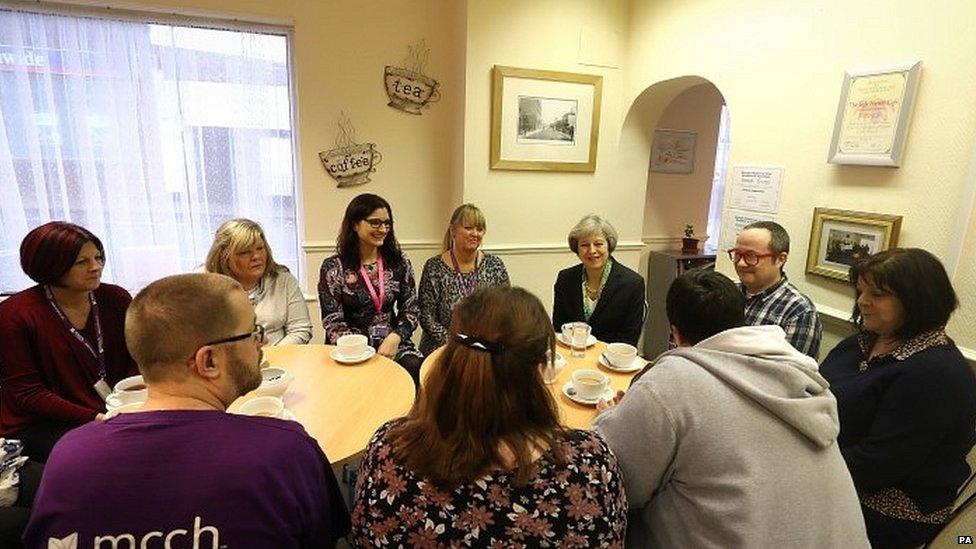The shared society - more than a slogan?
- Published

When she began her leadership campaign to move into No 10, in an uncharacteristically brash statement, the then home secretary stood up and said: "I'm Theresa May and I'm the best person to be prime minister."
But in the six months since she did take charge, far, far faster than she had anticipated, politics has been dominated by the questions the prime minister doesn't want to answer yet - on how she plans to negotiate our EU exit.
And without very much evidence of a bold vision on that front in recent weeks, charges that her government is directionless, drifting, have started to gain currency.
That's why her first big speech of the year, the start of what aides describe as a "lot more activity", matters, as the prime minister seeks to try to explain to the public why she believes she is the best person to be prime minister.
After her speech on the steps of Downing Street, and the Tory party conference in October, and under the glittering chandeliers of the Mansion House before Christmas, today was one of what's still only a handful of opportunities she has taken to sketch her own image as the occupant of Downing Street.
If you were hoping for radical departures from the PM, you'd have been disappointed.
In fact it was striking how familiar today's speech was to those previous few - whole sections were more or less identical, with another strong restatement of her belief that for millions of people, life just doesn't feel very fair.
She is not a politician trying to sell a cheery vision, not a politician claiming that nirvana is around the corner. She mentioned the word injustice 17 times, what she described as "everyday" injustice that breeds resentment between young and old, London and the rest of the country, rich and poor.
Listening to her on all of those big occasions, despite having been at the top table of the government for six years, you sense that Theresa May fundamentally thinks that there is quite a lot that is wrong with Britain.
But alongside what feels by now, a familiar and rather downbeat analysis of the state we are in, for the first time came what the prime minister wants us to see as her solution to all that.
Theresa May warns about rise of 'fringe' politics
Not the Big Society of David Cameron, nor even Margaret Thatcher's much misquoted statement, "there is no such thing as society - there are individual men and women, and there are families. And no government can do anything except through people, and people must look to themselves first".
But for Theresa May it is a "shared society", where we all have responsibilities to each other, and an "active" government has a responsibility to step in to help, not just the poorest, but the millions in the middle too.
After a while, every political leader finds themselves in need of a slogan, and it's certainly not the worst that's ever been dreamed up.
She wants you to see her and her party as the sensible middle, on the side of ordinary families, not veering away from the centre ground. It's about as clear an appeal to Middle England, where elections are traditionally won, as you can find. But while she gave today the skeleton of a philosophy, there was not a fully fleshed-out body of policy to accompany it.
And even before the speech was given, the policy that she did talk more about crashed into the common problem of reality versus political rhetoric. Theresa May's desire to make sure that people who need help with their mental health, particularly children, get what they need as soon as possible, and that society sheds the stigma around it, seems genuinely felt.
But she is not the first Conservative politician to have made such a promise. Her predecessor made a similar big one exactly a year ago.
And more importantly perhaps, there is deep scepticism from opposition politicians and those who work in the sector, that the system can work properly without a significant amount of extra cash.
What's happening on the ground was described to me as a "car crash" today by someone in the sector. However many times the prime minister says she wants to make sure mental health is treated just a seriously as physical health, the pressures on funding right across the NHS do matter.
Today's measures are also about where money is being allocated, not opening up the taxpayer's chequebook to top up health budgets.
But that's not the only political problem that Theresa May's vision of a "shared society" will face. Prime ministers are always defined by what they choose to pursue but also by what they can't control.
In managing our departure from the EU, she faces the biggest challenge any leader has had in decades. Preventing her government from becoming consumed by that will take more than a series of speeches and a new slogan.